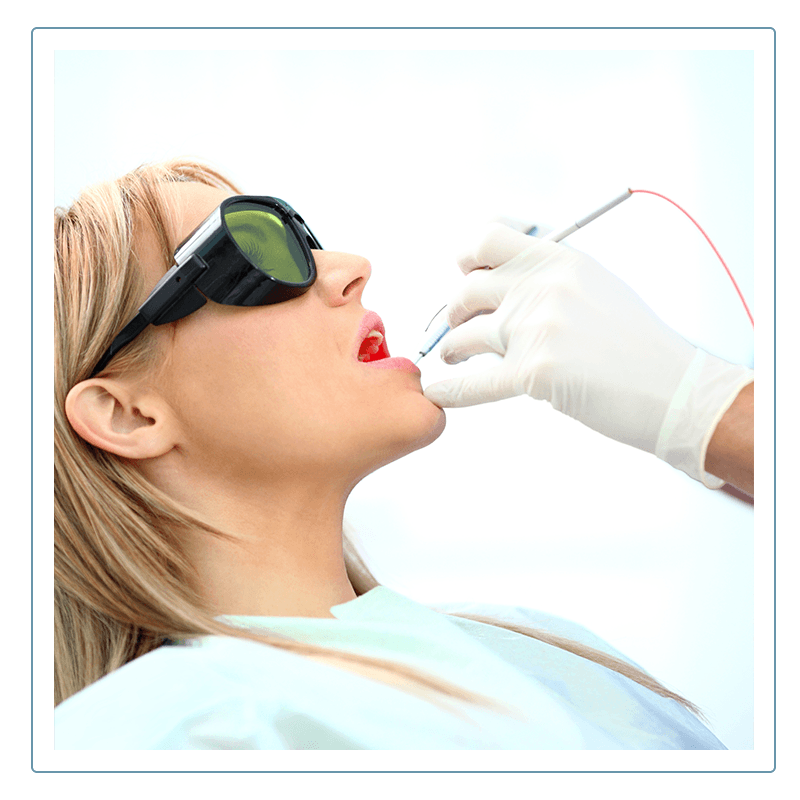Dr. Paul Koch of Koch Aesthetic Dentistry in Birmingham, Alabama is devoted to providing the most advanced treatment in dental procedures and even gives lectures to other dentists around the country. You can take comfort in knowing you are getting a top-quality dentist with Dr. Koch.

Laser Dentistry Technology in Birmingham, AL

What Is Laser Dentistry?
Laser dentistry is the use of lasers to treat a variety of dental conditions. This technology is now commonly used by dentists and is a reliable way to treat many dental conditions, often in a more efficient, less painful way.
One of the most exciting advances offered at Koch Aesthetic Dentistry is this type of laser dentistry technology. From using dental lasers for diagnostics to dental implants to gum treatment, Koch Aesthetic Dentistry is on the forefront of laser dentistry.
Find Advanced Technology in Birmingham, Alabama w/ Our Dental Laser
Dr. Paul Koch of Koch Aesthetic Dentistry in Birmingham, Alabama is devoted to providing the most advanced treatment in dental procedures and even gives lectures to other dentists around the country.
DIAGNOdent Dental Laser
To detect cavities, Dr. Koch uses DIAGNOdent, a dental laser that allows for cavity detection earlier and with greater accuracy than traditional x-rays. Because he can diagnose decay sooner with laser dentistry, he can often minimize the necessary treatment. We offer this new technology for patients around the Mountain Brook areas.
Laser Filling for Cavities and Dental Implants
Laser dentistry is just one example of how Dr. Paul Koch offers the latest in dental technology to the Birmingham, Alabama area. Another example is the CT scan and VR software Dr. Koch uses for dental implants.
This procedure allows Dr. Koch to take a 3-D scan of a patient’s mouth, assess bone density and determine problem spots and then design a dental implant restoration that can be placed in about an hour. We realize how important your time is, and our caring staff will be as prompt as possible.
In addition to detecting cavities, a dental laser can also remove decay without the use of anesthesia. Imagine a method of tooth treatment without drilling! It may sound scary, but having cavities treated with dental lasers is virtually pain-free and results in shorter healing time for our Alabama dental patients located around the greater Mountain Brook area.
Gum Treatment
Dental lasers aren’t just used for teeth. A dental laser can be valuable in other cosmetic dentistry applications such as treating gum disease or re-contouring an uneven gum line to get rid of a “gummy” smile. Since there are no incisions, there won’t be any scars. The dental laser also cauterizes as it cuts, which means no bleeding and a lower risk of infection.
Laser Dentistry vs Typical Treatment Plans
So why is laser dentistry sometimes a better option than a typical treatment plan? There are many reasons that this method of dental treatment can sometimes be the smarter, more efficient mode of dental care.
For example, laser dentistry treatment may mean there are fewer sessions needed. This means there can be shorter recovery times as well as a smaller bill for you and/or your insurance company.
Additionally, because the lasers cauterize the areas we’re working on, there is less of a need for sutures, bleeding is minimized, and wounds generally heal faster. This type of work involves less damage to your gum tissue as well.
Because laser dentistry can be quicker and less painful as well, anesthesia may not be necessary in a procedure that would traditionally require it. Additionally, because lasers sterilize the area, there is reduced risk of bacterial infections.
Determining whether laser dentistry is a better option for your specific procedure is made with your individual dentist. We’ll visit with you individually, discussing your needs and the best options available for you.
Contact us today!
For any questions about laser dentistry, don’t hesitate to ask. Simply call, text, or contact us using the online form at the bottom of this page. Koch Aesthetic Dentistry is here to provide you the excellent treatment you deserve.


